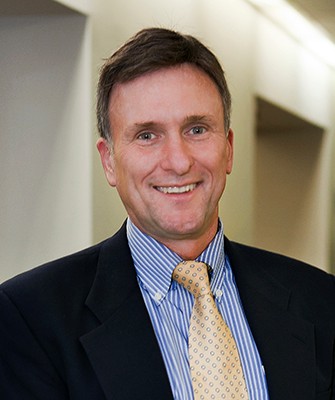True to his professional calling, Senior Lecturer Edward Taylor (Accounting) keeps a spreadsheet of classes he has taught at Boston College over the past 31 years. With rows and columns now running seven pages, the numbers show that after entering final grades for his four classes this past semester, Taylor could say he had taught exactly 200 courses at the University—and a total of 7,745 students. “Only an accountant would keep such records,” Taylor noted in an interview.
And perhaps only Taylor teaches accounting—taxation in particular—the way he does. The award-winning professor has taught the vast majority of M.S.A. students since the master’s program began in 2001, and he is known by them and others for delivering a sense of immediacy to tax education.
Taylor will usually start off a session of Advanced Federal Taxation, for example, with discussions of tax news reported that morning in the Wall Street Journal. At some point, he’ll also share stories from the front lines of tax practice (he’s a partner at Boston-area accounting firm Nardella & Taylor, LLP). It’s his way drawing students into the rigorous subject matter of tax accounting.
Tax news can be fairly random, as made clear enough at the start of a class in early February.
“What’s the issue with Michael Jackson?” Taylor asked his 25 students in one section of the graduate-level Advanced Federal Taxation. Their assigned reading had included a Journal piece about a tax dispute between the IRS and the late king of pop’s estate. After a quick exchange, Taylor pivoted to another story about people (like him) who placed winning bets over the weekend on the Patriots in the Super Bowl. At least one young man sporting an Eagles T-shirt learned that his fantasy sports winnings are all too taxable.
There was, however, a recurring theme in the tax news this semester. In Washington, the battle lines over tax reform began forming—raising the distinct possibility that students would be starting their careers amid a once-in-a-generation overhaul of the federal tax code. Headlines such as “Trump Unveils Broad Tax Cut Plan” (Wall Street Journal, April 26) launched several classes and connected with course material and topics.

Taylor, who is also associate chair of the Accounting Department, says his goal is always for students to “come to class thinking this is relevant to my life, and it’s actually fun.” He speaks of “bringing the world” into the classroom and the effect it has on accounting students. “It piques their interest because they’re talking about a real story. That’s what they remember most. They remember the stories,” he says.
Advanced Federal Taxation is an elective taken by a mix of M.S.A. students and undergraduate seniors; the class helps with preparing for the regulatory section of the C.P.A. exam. This semester, in addition to two sections of that course, Taylor taught Federal Taxation, an undergraduate requirement, and a new online course for M.S.A. students. Altogether he normally teaches 10 courses a year including summer offerings.
Scanning the Headlines
Hanna Stone, M.S.A. '17
“There’s so much going on in the tax world, and during the class I’ve gotten into the habit of checking the tax news every day,” said Hanna Stone, M.S.A. ’17, who did her undergraduate work in accounting at the University of South Carolina in Columbia.
Stone pointed to the April 26 item about Trump’s tax proposal, which Taylor brought up at the start of class that day. One key part of the plan would dramatically lower taxes for individuals who file in the category of so-called “pass through” corporations including partnerships and S corporations—two entities that happened to be included in the planned topic of that class.
“With a snap of the fingers, he connects that to the topic. So it’s seamless going from the news to the lecture,” said Stone, who will begin work in July at PwC’s international tax practice.
Many of the stories come not from the news cycle but from Taylor’s experiences in the field. There was the time, for instance, when one of his clients sold a company for $80 million. “In my class, we walked through how the transaction was conducted,” he relates. “Or maybe somebody is being audited by the IRS,” Taylor adds. In that case, he steers the class through issues that arise in the audits.
At this stage of his career, he has considered setting aside his own practice and devoting full energy to teaching, but his students are actually a big part of the reason why he keeps a hand in the business.
“I think I’d lose my edge if I weren’t practicing,” Taylor explains, referring to his effectiveness in the classroom. “You could read all you want, but unless you’re on the front lines, experiencing it”—there was no need to complete the sentence.
William Bole is senior writer and editor at the Carroll School.
Photography by Gary Gilbert.


